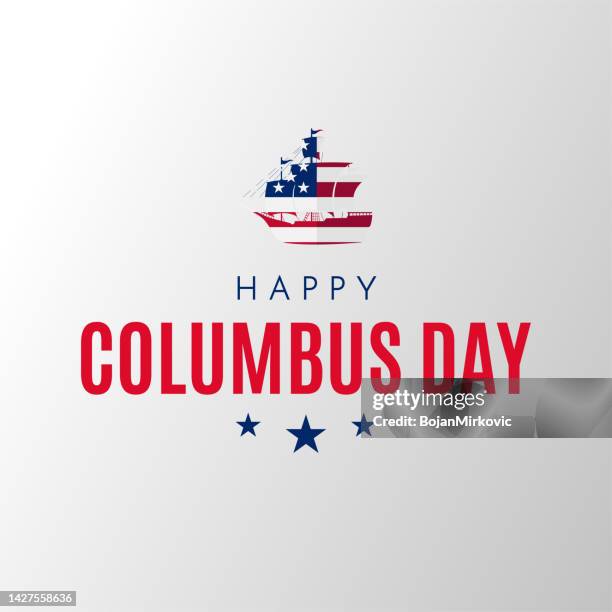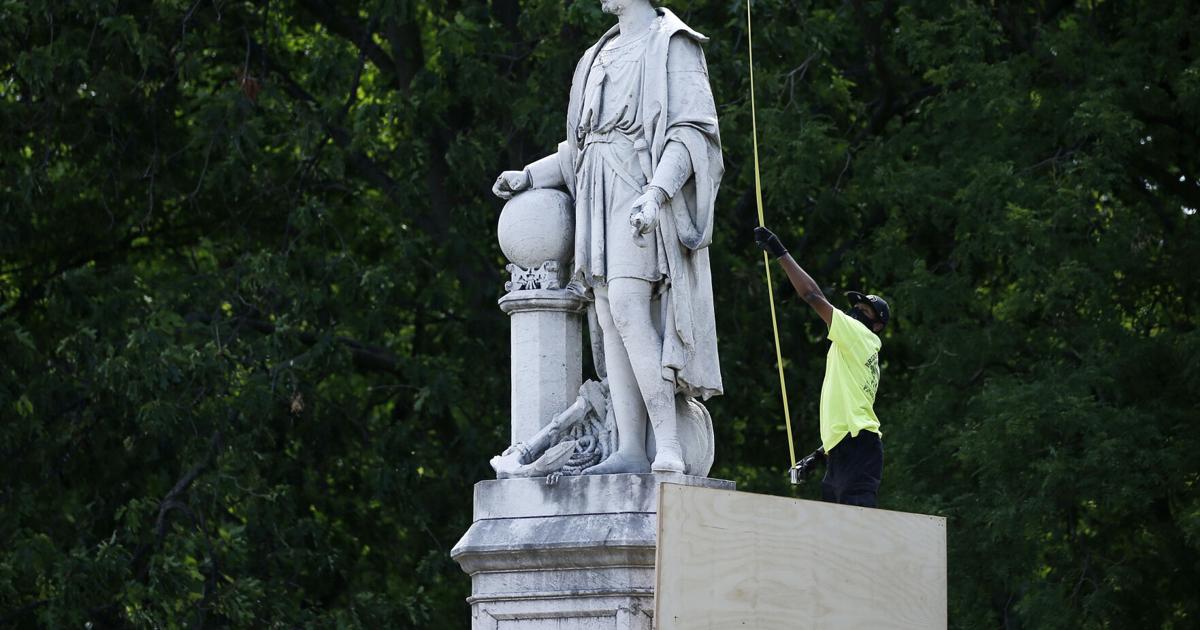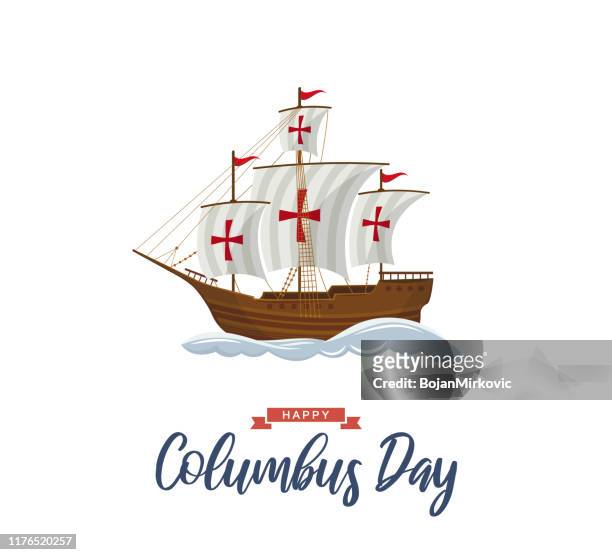Columbus Day Images, Memes & More! Get Inspired
Is Columbus Day a celebration of discovery or a reckoning with history? The answer, it seems, is increasingly the latter, as the narrative surrounding Christopher Columbus and his legacy continues to evolve under the weight of historical scrutiny and shifting cultural perspectives.
For many years, Columbus Day, observed annually in numerous nations across the Americas and beyond, has served as a formal commemoration of Christopher Columbus's arrival in the Americas on October 12, 1492. It has been a day for parades, patriotic displays, and expressions of national pride. However, in recent decades, this celebration has faced increasing criticism and controversy, leading to a re-evaluation of Columbus's place in history and the significance of the holiday itself. The core of the debate lies in the stark contrast between the traditional image of Columbus as a heroic explorer and the documented consequences of his arrival for the indigenous populations of the Americas. While Columbus is credited with opening up the Americas to European exploration and colonization, his actions also led to the exploitation, enslavement, and decimation of Native American communities. The arrival of Europeans brought diseases to which indigenous people had no immunity, resulting in widespread epidemics that decimated entire populations. Furthermore, the pursuit of land and resources led to violent conflicts and the displacement of native peoples from their ancestral territories.
| Aspect | Details |
|---|---|
| Historical Context | Columbus's voyages were commissioned by the Spanish Crown in the late 15th century, seeking a westward route to the East Indies for trade. |
| Columbus's Ships | The Nina, the Pinta, and the Santa Maria were the three ships that made the voyage across the Atlantic. |
| Landing Site | Columbus first made landfall on an island in the Bahamas, which he named San Salvador. |
| Indigenous Encounter | Columbus encountered the Taino people on the islands he explored, initiating a complex and often tragic relationship between Europeans and Native Americans. |
| Impact of Colonization | European colonization brought about significant changes in the Americas, including the introduction of new crops, animals, and technologies, as well as the spread of diseases and the displacement of indigenous populations. |
| Modern Controversies | Columbus Day is increasingly controversial due to the historical injustices and negative consequences associated with European colonization, leading to calls for the holiday to be replaced with Indigenous Peoples' Day. |
| Indigenous Peoples' Day | Many cities and states have replaced Columbus Day with Indigenous Peoples' Day, recognizing the history and contributions of Native Americans. |
| Alternative Celebrations | Some communities celebrate Italian-American heritage on Columbus Day, acknowledging the contributions of Italian immigrants to American society. |
| Ongoing Debates | The debate over Columbus Day reflects a broader discussion about how to reconcile historical narratives with contemporary values and perspectives. |
Further Information: History.com - Columbus Day
- Alyson Reed From Ms Darbus To Broadway Star Hsm Legacy
- Dating Images Exploring Black Women What You Need To Know
The growing awareness of this dark side of Columbus's legacy has fueled a movement to replace Columbus Day with Indigenous Peoples' Day, a holiday that honors the history and contributions of Native Americans. This shift reflects a broader effort to decolonize historical narratives and acknowledge the perspectives of marginalized communities. Many cities and states across the United States have already made this change, recognizing Indigenous Peoples' Day on the second Monday of October. These changes are not merely symbolic; they represent a significant step towards acknowledging the injustices of the past and promoting a more inclusive understanding of American history. The movement to replace Columbus Day is not without its critics. Some argue that it is an attempt to erase or rewrite history, and that it unfairly demonizes Columbus, who was a product of his time. Others maintain that Columbus's contributions to exploration and navigation should still be recognized, regardless of the negative consequences of his actions. However, proponents of Indigenous Peoples' Day argue that it is not about erasing history, but about telling a more complete and accurate story that includes the voices and experiences of those who were historically marginalized.
As the debate over Columbus Day continues, it is important to consider the various perspectives and historical complexities involved. There is no single, easy answer to the question of how we should remember Columbus and his legacy. However, by engaging in open and honest dialogue, and by acknowledging the perspectives of all communities, we can work towards a more just and equitable understanding of the past. One of the key challenges in this debate is how to reconcile the celebration of exploration and discovery with the recognition of historical injustices. It is possible to acknowledge Columbus's role in opening up the Americas to European exploration without glorifying the violence and exploitation that followed. Similarly, it is possible to recognize the contributions of Italian-Americans to American society without ignoring the suffering of Native Americans. Ultimately, the goal should be to create a holiday that is both inclusive and historically accurate, one that honors the diversity of American society and promotes a more just and equitable future.
In Chicago, Illinois, for example, the annual Columbus Day parade on State Street on October 10, 2016, served as a focal point for both celebration and protest. While many Italian-Americans proudly marched in the parade, celebrating their heritage and the contributions of Italian immigrants to American society, others used the occasion to voice their opposition to Columbus Day and to call for greater recognition of indigenous rights. This tension reflects the broader national debate over Columbus's legacy and the meaning of the holiday. The images from that parade, and from Columbus Day celebrations across the country, capture the complex and often contradictory emotions associated with the holiday. There are images of smiling faces, waving flags, and patriotic displays, but there are also images of protesters holding signs and chanting slogans, demanding justice for indigenous peoples. These images serve as a reminder that Columbus Day is not simply a day of celebration, but also a day of reflection and reckoning.
- See Washington Dc From Above Aerial Views History
- Marjorie Merriweather Post Cereal Heiress Socialite More
The availability of "38,884 free images of Columbus Day" online speaks to the continued interest in and engagement with the holiday, despite the controversies surrounding it. These images, which can be found on various websites and platforms, offer a visual representation of the different ways in which Columbus Day is celebrated and commemorated. Some of these images depict traditional celebrations, such as parades and historical reenactments, while others offer more critical perspectives, highlighting the impact of Columbus's arrival on Native American communities. The ability to "browse Columbus Day images and find your perfect picture" reflects the diverse range of perspectives and interpretations that exist regarding the holiday. Whether one is looking for images that celebrate Columbus's legacy or images that critique it, there is a wealth of visual resources available online.
The availability of free graphic resources, such as "Columbus Day vectors, stock photos & psd files," further underscores the continued relevance of the holiday in contemporary society. These resources are used by designers, marketers, and educators to create materials that commemorate or critique Columbus Day. The fact that these resources are often offered for free and for commercial use suggests that there is a significant demand for content related to Columbus Day, both from those who wish to celebrate the holiday and from those who wish to engage in critical discussions about its meaning and significance. The ability to "find & download free graphic resources for Columbus Day" empowers individuals and organizations to create their own visual narratives about the holiday, reflecting their own perspectives and values.
Websites that offer "free for commercial use high quality images" related to Columbus Day provide a valuable service for those who need visual content for their projects. These images can be used in a variety of contexts, from websites and social media posts to presentations and educational materials. The availability of high-quality images ensures that users can create visually appealing and professional-looking content, regardless of their budget. However, it is important to use these images responsibly and ethically, taking into account the controversies surrounding Columbus Day and the perspectives of Native American communities.
The ability to "browse 2,647 Columbus Day holiday photos and images available" online offers a comprehensive overview of the different ways in which the holiday is celebrated and commemorated. These images capture a wide range of emotions, from joy and patriotism to anger and protest. By browsing these images, one can gain a deeper understanding of the complex and often contradictory meanings associated with Columbus Day. The availability of such a large number of images also reflects the continued relevance of the holiday in contemporary society, despite the controversies surrounding it.
The phrase "Happy Columbus Day USA background" represents a common sentiment expressed during the holiday, particularly in the United States. This sentiment reflects the traditional view of Columbus Day as a celebration of discovery and national pride. However, it is important to recognize that this sentiment is not universally shared, and that many people, particularly Native Americans, view Columbus Day as a day of mourning and remembrance.
The statement "We did not find results for:" suggests that some searches related to Columbus Day may not yield the desired results. This could be due to a variety of factors, such as misspellings, incorrect search terms, or a lack of relevant content. In such cases, it is important to "check spelling or type a new query" in order to refine the search and obtain more accurate results. The ever-evolving nature of online content means that search results can change over time, so it is always a good idea to double-check the spelling and accuracy of search terms.
The existence of "a collection of the top 40 Columbus Day wallpapers and backgrounds available for download for free" demonstrates the continued popularity of the holiday, at least among some segments of the population. These wallpapers and backgrounds often feature images of Columbus, his ships, and other symbols associated with the holiday. The fact that these images are available for free download suggests that there is a significant demand for them, particularly among those who wish to personalize their computers or smartphones with Columbus Day-themed imagery.
The hope that people "enjoy our growing collection of HD images to use as a background or home screen for your smartphone or computer" reflects the desire to provide users with visually appealing and engaging content related to Columbus Day. These images can serve as a reminder of the holiday and its associated themes, whether one views them positively or critically. The availability of HD images ensures that users can enjoy high-quality visuals on their devices, enhancing their overall experience.
The recognition of "types of Columbus Day images available" highlights the diversity of visual content associated with the holiday. These images can range from historical depictions of Columbus's voyages to contemporary photographs of parades and protests. By understanding the different types of images that are available, one can better navigate the online landscape and find the content that is most relevant to their needs.
The offering of "a variety of Columbus Day images in jpg, ai, and eps file formats" caters to the diverse needs of users with different technical requirements. Jpg files are commonly used for photographs and other raster images, while ai and eps files are vector formats that are suitable for graphic design and illustration. By providing images in a variety of formats, websites can ensure that users can access and use the content regardless of their software or technical expertise.
The statement that "You will find images of Columbus himself, ships, maps, native americans, and other related themes" provides a comprehensive overview of the types of visual content that are typically associated with Columbus Day. These images reflect the various aspects of Columbus's legacy, from his voyages of exploration to his interactions with Native American communities. By exploring these images, one can gain a deeper understanding of the historical context and cultural significance of Columbus Day.
"Columbus day memes have quickly become a popular way to look at christopher columbus and the holiday." This statement highlights a significant shift in how Columbus Day is perceived and discussed in contemporary society. Memes, with their blend of humor and social commentary, have emerged as a powerful tool for engaging in critical conversations about historical figures and events. In the case of Columbus Day, memes often challenge the traditional narrative of Columbus as a heroic explorer, highlighting the negative consequences of his arrival for Native American communities.
"These memes mix humor and thoughts, giving a new way to talk about columbus day and its debates." This underscores the role of humor in making complex and often controversial topics more accessible and engaging. By using humor, memes can break down barriers and encourage people to think critically about Columbus's legacy and the meaning of the holiday. The combination of humor and thoughtful commentary allows for a more nuanced and multifaceted discussion of Columbus Day.
"By using fun and satire, these memes let people share their views on his legacy in a light way." This highlights the power of satire as a tool for social critique. Satire can be used to expose hypocrisy, challenge authority, and promote social change. In the context of Columbus Day, memes often use satire to poke fun at the traditional narrative of Columbus as a hero, while also raising awareness about the injustices suffered by Native Americans. This allows people to express their views on Columbus's legacy in a way that is both entertaining and thought-provoking.
The ability to "find & download the most popular columbus day photos on freepik free for commercial use high quality images" provides users with access to a wide range of visual content that can be used for a variety of purposes. These images can be used in websites, social media posts, presentations, and other materials. The fact that these images are available for free and for commercial use makes them a valuable resource for individuals and organizations who wish to create content related to Columbus Day.
The existence of "Historically accurate columbus day memes (31 images) by toaster_strudel" suggests an effort to inject factual information into the often-humorous world of internet memes. By labeling these memes as "historically accurate," the creator is signaling a commitment to providing accurate and reliable information about Columbus Day, even within the context of a meme. This is a positive trend, as it helps to ensure that the discussions surrounding Columbus Day are informed by facts and evidence, rather than misinformation or stereotypes.
The fact that these memes were "Published 4 years ago in funny" provides some context for their creation and reception. Four years ago, the debate over Columbus Day was already well underway, but it may not have been as widespread or as intense as it is today. The fact that these memes were published in a "funny" section suggests that they were intended to be humorous, but also to spark conversation and debate about Columbus's legacy.
The phrase "Well, it's that time of year again," serves as a familiar and somewhat resigned acknowledgment of the annual recurrence of Columbus Day and the debates that surround it. It suggests that the issues and controversies associated with the holiday are not new, but rather a recurring feature of the cultural landscape. This phrase can be interpreted as both a sigh of weariness and a call to action, reminding us that the work of reckoning with history and promoting social justice is an ongoing process.
- Inside Gabriel Iglesias House A Comedians Dream Home
- Untold Story Mount St Helens Eruption In 1980 Rare Photos

698 Discover Card High Res Vector Graphics Getty Images

Indigenous activists see Trump's Columbus Day rhetoric as cause for

698 Discover Card High Res Vector Graphics Getty Images